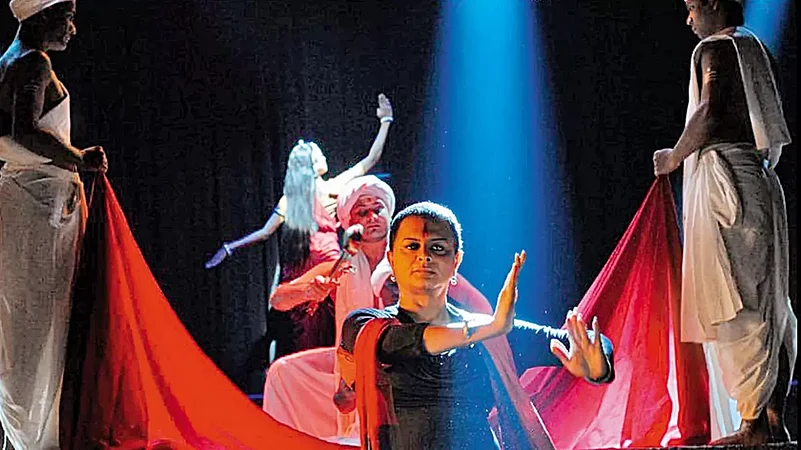Ritupararno Ghosh’s Chitrangada (2012) opens with a shot of a choreographer, Rudra (Ghosh), in a hospital bed for a sex reassignment surgery. The camera descends on him, forming an eventual frame where the bedside rod partitions his face. This economic cinematography encapsulates the whole film in a few seconds: a (biological) man split in two halves. The person the world wants him to be, and the person he is. Or, more appropriately, who he is not. Not an engineer, not macho, not normal. Not enough. This imposition of identity, though, can find its resolution in a simple question: Why not ask Rudra?
The inability to listen and observe—and internalise and empathise—marks many Indian movies on marginalised characters and themes. The counterparts of ‘white saviours’ are less interested in talking, and more obsessed with talking down, to their audiences. But Chitrangada is different—because Ghosh was different. Over 19 films spanning two decades, he first untangled his audiences, then untangled himself. In the first phase of his career dominated by elite domestic dramas—such as Unishe April (1994), Bariwali (1999) and Utsab (2000)—he wooed the Bhadralok audiences, fed up with brain-dead kitsch, back to the theatres. He broadened his ambition in the aughts, casting Bollywood stars in Chokher Bali (2003), Raincoat (2003) and The Last Lear (2007). And in his last few years, he turned the lens on himself, both as a filmmaker and as an actor, directing and appearing in movies that probed the confusion of same-sex desire, the tyranny of propriety and the prison of identities—a swansong doubling up as both filmmaking and homecoming.
Based on Rabindranath Tagore’s play, Chitrangada, which adapted the story of a character from the Mahabharata called Chitrangada—a woman raised as a man, conflicted about her identity, smitten with Arjuna—Ghosh’s version gives it a modern mould. Centred on Rudra, staging the play, and his drug addict boyfriend, Partho (Jisshu Sengupta), it is in essence a romance of outcasts: a transgender artist falling for a broke wastrel. But their relationship hits a dead-end when they decide to become parents. Since the law forbids same-sex couples to adopt a child, Rudra opts for a sex change operation. But Partho, mocking the idea of a ‘synthetic’ partner, breaks up with Rudra.
Even though Chitrangada isn’t the kind of movie that is often made in Bengali—or Indian—cinema, Ghosh treats it like any other story. The film, for instance, doesn’t resort to needless melodrama just because its subject is ‘different’. While portraying characters on the margins, many writers and directors either demonise or deify them—reducing them to types, diluting their complexities—but Ghosh does neither. He observes, absorbs, recedes, taking us on a journey, nudging us to tread between the lines.

If this is a film about a person in transition, then its telling, vacillating from questioning others to questioning oneself, reflects that multi-tiered tension. A tension unfolding as a meta, literary and autobiographical inquiry. Ghosh achieves this through a fascinating narrative frame—hinged on a series of conversations between Rudra and his counsellor, Shubho (Anjan Dutt)—that pops multi-faceted discussions on despair and desire, confusion and exasperation, society and self. Rudra endures rejections, from both his father and partner, ending up irrevocably alone. And in the climax, we find out that even Shubho, with whom he shared moments of quasi-intimacy, doesn’t exist. Spurned by all, Rudra has taken refuge in the ultimate narcissism: falling in love with his own self.
The movie seems to be aware of this self-reflexive tilt. Take an early scene where Rudra explains the play’s story to Shubho. He asks, “Isn’t it a bit autobiographical?” It’s not too far-fetched to see Chitrangada as an example of a filmmaker withdrawing inwards—framing elaborate conversations with himself—in the context of Ghosh’s relationship with his audiences. Because once a celebrated director, his cultural currency took a massive hit in his final few years when his once champions, the Bhadralok patrons, turned their backs on him—disapproving of his cross-dressing and queer cinema—calling him ‘Rituporno’.
His directorial detour merits attention even for those who are critical of his filmmaking, such as Moinak Biswas, professor of film studies at Jadavpur University. Moving from being a “pioneer of a genre of Bengali movies,” says Biswas, “that exclusively addressed the gated community of the urban upper-middle-class audience”—emerging from post-economic liberalisation—Ghosh’s “Chitrangada moved into a domain where the circle is drawn around ‘I’, which has some disruptive potential.”
The film also invites other interpretations. The most obvious is literary. Ghosh was fascinated by Tagore—adapting his stories, incorporating his poems, making a documentary on him—but in Chitrangada, according to professor Daisy Hasan, he uses the fabled dance-drama to unleash ‘greater queer possibilities’. It’s also charged by surreal storytelling, melding past, present, future; dreams, alter-ego, realities. Which compels us to consider an aesthetic and political question: In a world that doesn’t recognise queer relationships as ‘real’, how else would their cinematic counterparts look like?
Sometimes the implications are simpler but no less significant. “Given that the roots of the story lay in the Hindu epics,” adds Hasan, “the film can also be read as an attempt to critique the Hindu Right’s appropriation of mythological texts.” Sometimes the autobiographical and literary collide, resurfacing first as self-doubt (when Rudra calls his stage adaptation a ‘glossy spectacle’ lacking ‘soul’ because he does ‘not know Chitrangada well enough’) and later as self-discovery (when Rudra, content with an indeterminate state, refuses the sex reassignment operation).
Helped by the celebrity status of its filmmaker, Chitrangada brought queer desires into our theatres and homes. Besides his directorial felicity, Ghosh’s confidence and control as an actor are equally striking. In Arekti Premer Golpo (2010)and Memories in March (2010)—directed by Kaushik Ganguly and Sanjoy Nag—he continued to dignify topics considered taboo. In the former, he plays a transgender filmmaker making a documentary on a real-life female impersonator in Bengali theatre, Chapal Bhaduri, and in the latter, he forges a warm bond with his deceased boyfriend’s mother. These roles illustrate Ghosh’s wide range as an actor: his easy relationship with humour, his understated portrayal of a sombre character, his ability to perform via dialogues and mannerisms.
But his critics also accuse him of elitism, saying his films—confined to privileged cocoons and reinforcing the class divide—gloss over the local subcultures of the hijra and kothi communities. Even though equating absence to omission can be a simplistic reading of cinema, these criticisms arise from legitimate concerns. Would Ghosh have course-corrected, adding a new dimension to his oeuvre? We’ll never know, because he died a year after Chitrangada’s release. He didn’t live long enough to see the changing contours of LGBTQ rights and activism either. Most Indian directors don’t create personal art, and even fewer create the kind of cinema powered by a singular ferocity and vision like Ghosh’s. So it’s not tough to believe that he may have felt like an island in the final phase of his career. The last decade, however, has seen a distinct increase in the number of films and film festivals foregrounding queer stories, where Ghosh always seems to be present even through his absence. In that changing world, we can only ponder the extent of his contributions. So, yes, he was an island—but one surrounded by a bracing sea, a sea of possibilities.
(This appeared in the print as 'Unleashing Queer Possibilities')






















